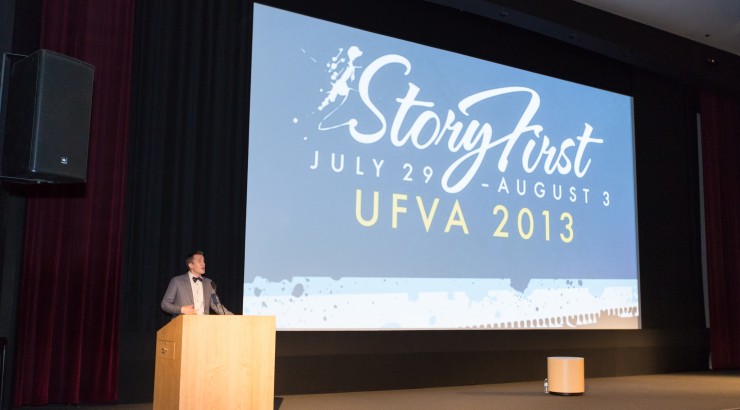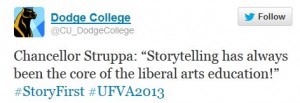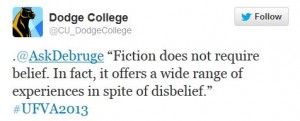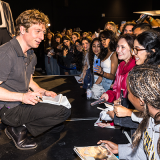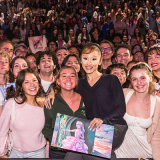UFVA Plenary Session with Peter Debruge: “Inventing Stories in the Reality Era”
August 5, 2013
Now that all the bustle and hubbub of the UFVA conference is over, ending with the annual banquet at the Bowers Museum Saturday evening, I have a chance to look back on the conference and remember some of my favorite moments of the incredible mix of speakers, panels, workshops, and social events our guests enjoyed over the past week.
Notably, the conference started out with an academic bang; adjunct Professor of Film Studies,
Peter Debruge
, headlined the plenary session, in which a renowned figure in the television and film industry addresses his or her academic colleagues. Given the wide range of subjects the audience – comprised mainly of teachers, staff, and graduate students – encounters through the conference, I really had no idea what to expect from the
Variety
Senior Critic.
Dean Bassett and Chancellor Struppa introduced the session, with some kind words about Dodge College’s program, and how it relates to the mission of UFVA in general.
We’re incredibly proud of the Dodge College faculty, and I hope you have the opportunity to visit with them over the next week. As Bob mentioned, we have a unique model here, with amazing faculty that love to teach our students. Dodge College, like Chapman University as a whole, has to continued to evolve and innovate over the past 20 years. Dodge exemplifies the best qualities of the University in their shared goal of allowing students to tell their stories on the global stage.
Mr. Debruge then launched into his talk, which primarily explored the blurred lines between reality and fantasy, as portrayed through the camera lens. He began by tracing some of the history of film, contrasting the two alternative approaches to filmmaking that existed decades before the somewhat arbitrary divide between “fiction” and “documentary” would come into play. On the one hand, filmmakers like the Lumière brothers tended to display life as it occurred around them, while the style exemplified by the works of Georges Méliès instead chose to explore the creative

landscape of the human mind, enabled by the use of special effects, editing, and montage.
In essence, he suggested, these two pioneering sets of films described a dichotomy of filmmaking approaches which has continued in an unbroken chain through to today. Where the Lumière brothers films lead us to The Cove or An Inconvenient Truth, Méliès gave birth to a tradition of films which lead us to Avatar and Star Wars. But, turning to examples fresh on most of our minds, films like The Dark Knight, Chronicle, Paranormal Activity, and Children of Men blur the lines between the two, taking a fantastic, effects-laden story, and casting it in the gritty, unmistakable trappings of documentary realism.
He explicated at length the tension between these two forces, weaving in modern tropes such as the mockumentary style of real-life-as-comedy exemplified by works like
The Office
and
Best In Show
, popular trends of pseudo-fiction clothed as the ‘reality’ in reality television, and developments in new media such as the first-person perspective commonly associated with videogames.
The topic is rife with interesting dynamics and consequences for film studies majors and TV production students alike; where does a filmmaker’s influence stop when a camera lens is used as both a narrative device and a weapon of real change, as we saw in the Arab Spring revolutions? Mr. Debruge encouraged the audience to embrace the multitude of meanings filmmaking produces – and to a larger extent, the variety of audiovisual mediums in general – and not to shy away from complexity, a reductive tendency teachers often rely on to explain sophisticated concepts. As a teacher of his once asked,
Altogether, the 2013 UFVA conference began with an eye-opening tour of the history of film, and what it means to be a teacher in today’s audiovisual, digitally-enhanced, always-connected classrooms. One thought which really stuck with me over the course of the week, as I attended various academic events, was this simple quote taken from David Shields’ book Reality Hunger:
“What I see happening out there, that I don’t necessarily see reflected in film school classrooms, is the way filmmakers are responding to what’s bubbling up in the documentary and reality TV worlds.
It’s great that we teach Ozu and Renoir and Welles — the canon, so future filmmakers will know the vocabulary of film — but the language is shifting under our feet. And the way I see it, writers and directors are looking for ways to make the stories they tell feel raw, spontaneous, and unprocessed. They want them to feel real.”
